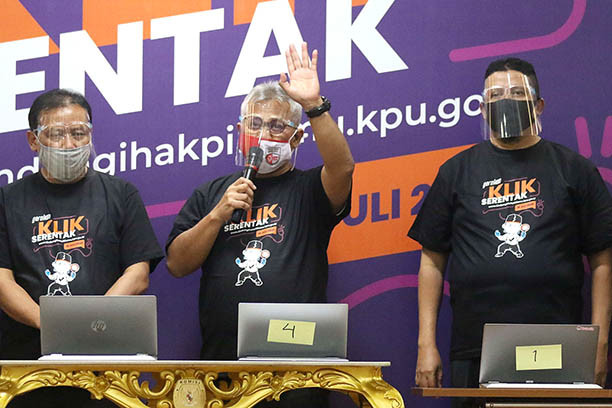Popular Reads
Top Results
Can't find what you're looking for?
View all search resultsPopular Reads
Top Results
Can't find what you're looking for?
View all search resultsKPU records sharp decline in independent candidates for year-end polls
The General Elections Commission (KPU) has announced that only 70 independent candidates are eligible to officially register to compete in the 2020 regional elections, fewer than many had initially anticipated.
Change text size
Gift Premium Articles
to Anyone
 Elections Supervisory Agency chairman Abhan (left), General Elections Commission (KPU) chairman Arief Budiman (center) and Election Organizers Ethics Council chairman Muhammad symbolically launch the Klik Serentak election verification movement at the KPU headquarters in Central Jakarta, on Wednesday. (JP/Dhoni Setiawan)
Elections Supervisory Agency chairman Abhan (left), General Elections Commission (KPU) chairman Arief Budiman (center) and Election Organizers Ethics Council chairman Muhammad symbolically launch the Klik Serentak election verification movement at the KPU headquarters in Central Jakarta, on Wednesday. (JP/Dhoni Setiawan)
The General Elections Commission (KPU) has announced that only 70 independent candidates are eligible to officially register to compete in the 2020 regional elections, fewer than many had initially anticipated.
The government has insisted on hosting the simultaneous elections in December despite the drawn out pandemic and continued rise in infections.
The circumstances appear to have had an impact on candidates that lack the solid backing of political parties, although most hopeful candidates failed to pass the preliminary stages of registration.
KPU commissioner Evi Novida Ginting Manik said the commission had spent months assessing the eligibility of all independent prospects before allowing them to register as official election candidates.
She said there were initially 201 people looking to compete for leadership positions in 127 regions across the archipelago.
These prospective candidates had managed to gather the required number of identification card numbers belonging to voters who supported their candidacies, as a prerequisite for eligibility under the 2016 Regional Election Law.
They then submitted the list along with the other requirements to the KPU’s regional offices in their respective regions by Feb. 24.
However, the KPU determined that only 70 of them had passed the full verification process, which was held from June 24 to Aug. 23, Evi said during a webinar this week.
In that same period, six people decided to withdraw their candidacies, while the rest of them either failed to produce the required documents or produced documents that could not be verified.
The remaining prospects can now submit their candidacy documents, including the various submission forms, their electronic ID cards and photocopies of their degree certificates during the registration period that began on Friday and ends this Sunday.
The KPU will then verify their documents and confirm their eligibility as official candidates on Sept. 26, which also marks the beginning of the election campaign period that runs until Dec. 5.
Election day is slated for Dec. 9, when voters are to elect a total of 270 regional leaders comprising nine governors, 224 regents and 37 mayors.
Read also: So much work, so little time: KPU under pressure over regional polls
Having independent candidates contest general elections is still relatively uncommon in Indonesia.
Independent candidates often lose out to those with well-established political ties, owing to the high costs of campaigning and the prevalence of vote-buying or other forms of money politics.
The KPU announcement shows that the number of independent candidates set to run in this year’s elections has sharply decreased compared to the 2015 polls, which were contested in a similar number of regions.
As many as 135 independent candidates competed in 269 regional elections across the country in 2015, almost twice as many as this year – that is, if they all manage to get approval from the KPU.
Furthermore, not all regional elections will see independent candidates running for the top job in the administration this year.
“The independent prospects are only eligible to register their candidacies in 58 regencies and five cities [holding elections],” said KPU commissioner I Dewa Kade Wiarsa Raka Sandi during the webinar on Wednesday.
Some election observers believe the drop in the number of independent candidates is “normal”, while others have warned it could potentially undermine democracy.
Khoirunnisa Nur Agustyati of the Association for Elections and Democracy (Perludem) argued that the decrease in independent candidates this year was understandable, given the tougher requirements introduced since the polls five years ago, especially in canvassing for initial support.
Government Regulation in Lieu of Law (Perppu) No. 1/2014 on regional elections required prospective candidates to gather the ID card numbers of 3 to 6.5 percent of the voters on the final voters list in their respective regions.
This threshold for public support was later raised to 6.5 to 10 percent after the 2015 Regional Elections Law was passed. The requirement, she said, was enforced for the 2017 and 2018 regional polls.
Dedi Kurnia Syah of the Indonesia Political Opinion (IPO) group suggested that the threshold be revised again so that more independent candidates could participate in the elections and improve the quality of democracy.
Read also: Majority of public wants regional elections delayed: Surveys
He noted that tougher requirements had driven independent candidates in several contested regions like West Sumatra to seek the support of political parties.
He said this trend could undermine the quality of the polls because it would expose formerly independent candidates to money politics and add to an already crowded playing field that does not necessarily favor competency.
“Political parties may end up endorsing candidates who are most likely to win the elections, rather than backing those who possess good leadership qualities,” Dedi told The Jakarta Post on Thursday.
“That will surely affect the quality of the next batch of regional leaders, too.”









